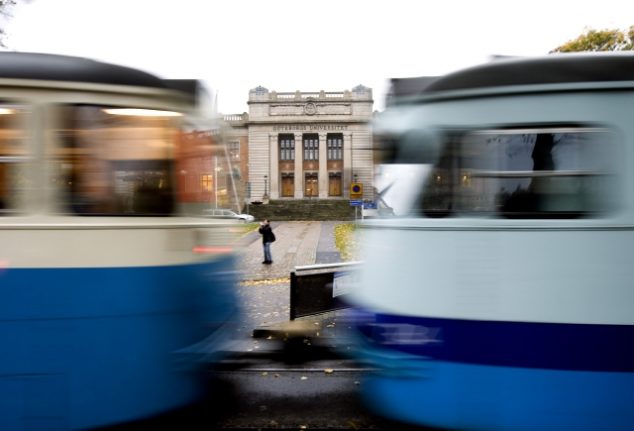Gothenburg may be the second biggest city in Sweden, but it remains something of a hidden gem – much to the delight of international students lucky enough to enrol at the University of Gothenburg.
“Gothenburg is a great city – it’s not too expensive, there are cool people, lots of events and concerts, and it’s really student-friendly,” says Monika Malak, a master’s student from Poland studying chemistry.
With ten campus areas throughout the city, the University of Gothenburg gives students with a sense that Gothenburg really is their city.
“The way the city and campus are meshed together makes it feel like everyone from the university is in the city center,” she explains. “You’re always meeting people, which is a makes it easy to have a fun social life.”
Molecular biology master’s student Emelyne Pacull, who hails from France, agrees.
Great for international students
“In other student cities I’ve been to you can’t meet people as easily as you do in Gothenburg,” she tells The Local.
Having the different campuses split up around the city centre means it’s always easy to meet up with someone. That’s especially good for international students as you get to meet people outside your specific field of study and feel like you get a bigger network then you would otherwise.”
Find out more about studying in Gothenburg
The University of Gothenburg is one of Sweden’s largest, and is home to a buzzing community of 37,000 students that give the city a special energy.
“The city is very walkable and really international; it’s really alive – there’s always stuff happening,” says Pacull. “You meet people from all over the world.”
 Gothenburg's popular Haga district. Photo: University of Gothenburg
Gothenburg's popular Haga district. Photo: University of Gothenburg
Pacull first came to the University of Gothenburg on an undergraduate exchange programme and quickly came to appreciate the city’s charm and the Swedish style of learning.
“I really missed the discussion we had in class in Gothenburg when I went back to finish my undergraduate degree in France,” she explains.
An accessible city
“I really liked the Swedish way courses are taught – with lots of autonomy and discussion. In France, the teacher is supposed to know everything and just lectures the students. But the Swedish way really feels like it’s more my style.”
And having a chance to pursue an advanced degree surrounded by the accessible urban milieu makes Gothenburg the “perfect city” for Pacull.
Malak also prefers campus life in Gothenburg.
“The university I attended in Poland was out in the suburbs and there was just nothing around. It was totally useless,” she says.
“The location of the different campuses makes the city really accessible. The university also has lots of libraries at different places. It’s sort of like everything is everywhere.”
Of all the different University of Gothenburg campuses, Campus Haga is the one Malak calls one of her favourite, in large part due it is proximity to the historic Haga district, which features cobblestone streets and picturesque wooden houses.
“It’s really easy to go shopping after class or duck into a cute café,” she quips.
Learn more about being a student at the University of Gothenburg
Another popular gathering place for Malak and other students is Järntorget square, which has a range of bars and restaurants that cater to a student budget.
And at the nearby King’s Head pub “there are always lots of Erasmus students speaking English”.
'Gothenburg feels like my city'
Pacull, meanwhile, prefers Humanisten, home to the Faculty of Arts and a campus bordering on a lush park named after the iconic Näckrosdammen pond.
“There’s a ton of green space that just explodes with blooming flowers in the spring, and in the winter you can see people having fun on the frozen pond,” she says.
 Järntorget square is a popular gathering place. Photo: University of Gothenburg
Järntorget square is a popular gathering place. Photo: University of Gothenburg
“Really all the campuses are pretty close to the centre of town or parks – you can even have a barbeque between classes when the weather is nice.”
After she finishes her degree later this year, Pacull says she’ll miss Gothenburg’s unique combination of having a “small town feel” while still offering access to big city cultural offerings.
And Malak is in no hurry to leave the city either, even though she expects to finish her master’s thesis by next summer.
“Gothenburg feels like my city. And I really like the university. The students are friendly and the campuses are close to everything,” she muses before offering some simple advice to anyone considering enroling at the University of Gothenburg.
“It’s one of the best choices you can make.”
This article was produced by The Local Client Studio and sponsored by the University of Gothenburg.



 Please whitelist us to continue reading.
Please whitelist us to continue reading.